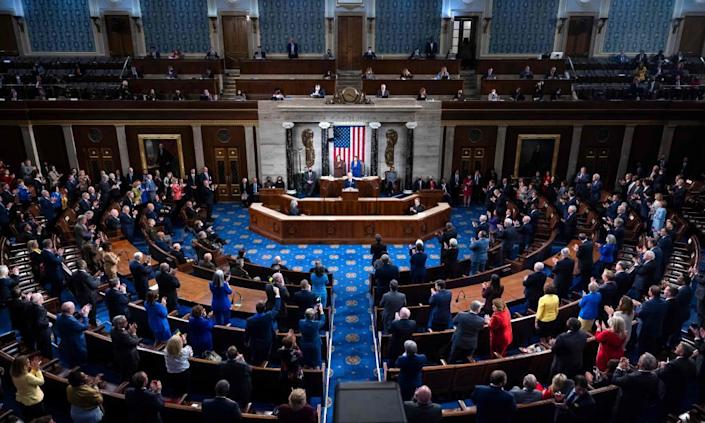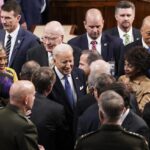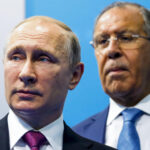Joe Biden vowed in his first State of the Union address to defend democracy threatened by war in Europe, pledging to punish Vladimir Putin for invading Ukraine, while also promising to tame rising inflation and return the nation to a “more normal” state as the coronavirus pandemic appears to wane.
Speaking before a joint session of Congress on Tuesday night, at a perilous moment for his presidency and the world, Biden accused the Russian president of trying to “shake the foundations of the free world” with a “premeditated and unprovoked” invasion of its Democratic neighbor.
Related: State of the Union takeaways: Biden talks tough on Putin and touts Covid progress
But he said the Russian leader had “badly miscalculated”, underestimating the response of the US and its allies, including ordinary Ukrainians.
“He thought he could roll into Ukraine and the world would roll over,” Biden said. “Instead he met a wall of strength he never imagined … Putin was wrong. We were ready.”
The president’s hour-long address was divided between the two biggest challenges confronting Biden’s presidency: the war in eastern Europe threatening an international order he spent much of his political career promoting and domestic travails threatening Democrats’ control of Congress in this year’s midterm elections.
From the wood-paneled House chamber, now a reminder of the fragility of democracy at home following the 6 January 2021 insurrection by supporters of Donald Trump, Biden declared that in “the battle between democracy and autocracy, democracies are rising to the moment”.
Speaking to an anxious nation, Biden detailed the administration’s efforts to prevent an invasion of Ukraine by declassifying intelligence and making Moscow’s plans public while claiming credit for rallying a global response, to impose crippling sanctions on Russian banks, industries, companies, elite oligarchs and Putin himself.
Biden again affirmed that the US would not send troops to fight Russia in Ukraine, but he made clear he would “defend every inch of territory of Nato countries with the full force of our collective power”.
As part of the White House’s efforts to isolate Putin, Biden announced on Tuesday night that the US would shut its airspace to Russian aircraft, following similar decisions by European Union nations and Canada, and would seek to mitigate the consequences of isolating oil-rich Russia by agreeing with other world powers to release 60m barrels of oil from their strategic reserves.
“When dictators do not pay a price for their aggression, they cause more chaos,” Biden warned.
The war in Ukraine brought rare bipartisanship to the House chamber, where members of both parties rose to applaud Biden when he disparaged Putin. Hailing the “fearlessness” and the “iron will” of the Ukrainian people, Biden introduced the visibly emotional Ukrainian ambassador to the US, Oksana Markarova. He asked the chamber to stand with him and send “unmistakable signal”, a message of solidarity with the Ukrainian people.
“Light will win over darkness,” he told her.
In his address, traditionally one of the most widely viewed speeches a president makes, Biden sought to assure Americans demoralized after two years of a global pandemic that transformed American life, and, now, rattled by a land war in Europe.
“I want you to know that we are going to be OK,” the president said.
Related: Tackling inflation is ‘top priority’, says Biden in State of the Union address
Biden spoke before daybreak in Ukraine, where Russia’s missiles rained down on cities across the country, killing civilians as an armored Russian military convoy advanced toward the capital, Kyiv. Between rehearsals of his address on Tuesday, Biden spoke by phone to Ukraine’s president, Volodymyr Zelenskiy.
“Last year Covid-19 kept us apart,” Biden said, surveying the chamber filled with lawmakers, cabinet officials and the justices of the supreme court as he opened his prime-time address. “This year we are finally together again.”
In a hopeful sign of the virus’s retreat, Biden arrived without a mask and hugged and clasped hands with attendees as he made his way to the rostrum. The chamber was nearly full for the first time since the pandemic began, with all 535 members invited to attend. Mask and vaccine requirements were dropped, but lawmakers had to test negative for the virus before entering the chamber.
Even as the crisis abroad overshadowed many of the political debates at home that have hurt his standing, Biden spent considerable time addressing concerns over inflation and the prolonged pandemic. Expressing empathy with Americans who were “tired, frustrated, and exhausted”, he highlighted the improving public health and economic outlook and declared that the country had reached a “new moment” in the fight against Covid-19.


“Let’s use this moment to reset,” Biden said. “Let’s stop looking at Covid-19 as a partisan dividing line and see it for what it is: A God-awful disease.”
In the Republican rebuttal to the president’s state of the union address, Kim Reynolds, the governor of Iowa, who rose to prominence by resisting many of the administration’s coronavirus guidelines, assailed Biden as a weak leader whose foreign policy failures had emboldened Russia and whose economic policies had hurt Americans.
In a separate response on behalf of the leftwing Working Families party, the Michigan congresswoman Rashida Tlaib urged the passage of Build Back Better legislation, arguing that “no one fought harder for President Biden’s agenda than progressives”.
In his remarks, Biden highlighted passage of his coronavirus relief package, known as the American Rescue Plan, and the bipartisan infrastructure law, which he plans to tout at an event in Wisconsin on Wednesday.
He also emphasized his nomination of Ketanji Brown Jackson to be the first Black woman to serve on the US supreme court, while praising the service of retiring Justice Stephen Breyer, whom she would replace on the bench.
Refusing to abandon his hopes of bipartisanship, even in the face of a Republican party that had broadly refused to accept his legitimacy as president, Biden outlined a “unity agenda” that he said could find bipartisan support. The list included combatting the opioid epidemic, expanding mental health resources, supporting the nation’s veterans and supercharging the “moonshot” effort to fight cancer, which is deeply personal for Biden, whose son Beau, died of brain cancer in 2015.
In rat-a-tat fashion, Biden unveiled several policy proposals and initiatives on a host of issues, including to invest in clean energy, improve supply chains, protect nursing home residents, and address mental health. Speaking to the members of Congress present, he asked for a long list of legislation, much of it unlikely to pass.
And pushing back on progressive activists in his party, he denounced calls to defund the police, stating loudly that the answer was to “fund the police” – a declaration that brought Republicans to their feet in agreement.
In closing, Biden offered a positive assessment of the strength of democracies around the world.
“We are stronger today than we were a year ago. And we will be stronger a year from now than we are today. Now is our moment to meet and overcome the challenges of our time – and we will,” he said.




